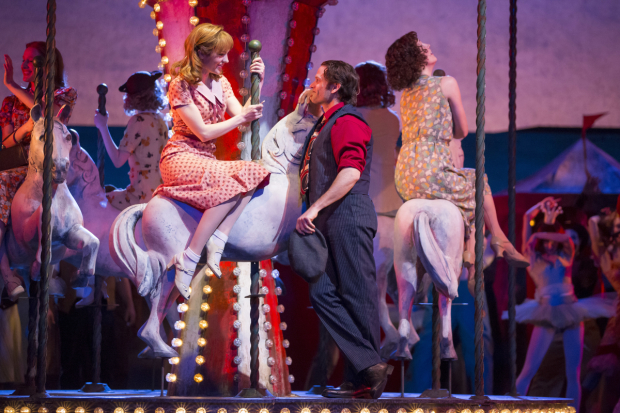Carousel
The Lyric Opera spins a sumptuous staging of Rodgers and Hammerstein’s 1946 musical.

(© Todd Rosenberg)
In the Lyric Opera's opulent staging of Rodgers and Hammerstein's Carousel, The score is inarguably glorious and swoon-worthy. But outside the music, the 1946 musical hasn't' aged particularly well. One moment you're soaring on the anthemic crescendos of "You'll Never Walk Alone," the next, you're brought up short by a leading lady who insists that when a man who loves you hits you, it doesn't really hurt.
That's precisely what heroine Julie Jordan tearfully asserts throughout the tale of a New England mill girl who falls in love with a carnival barker. Audiences of the 1950s might well have excused Billy Bigelow for hitting his saintly, suffering wife, Julie, and bought his repeated contention that hitting one's wife is a totally different thing than beating one's wife. That sort of equivocation simply doesn't play today, no matter how sizzling the magnetism that draws Julie and Billy together.
The drama follows the tragic love affair of Julie (Laura Osnes) and Billy (Steven Pasquale) from courtship to marriage, beyond death-do-us-part and into the world of their troubled 15-year-old daughter, Louise (Abigail Simon). The culmination of this sometimes grotesque but always beautiful cavalcade is the carousel itself, spinning and twinkling while the impossibly charismatic Billy lures in customers. He's quickly smitten by Julie, an innocent but strong-minded mill worker, who visits the carousel after work one day with her friend Carrie (Jenn Gambatese). Despite Billy's reputation as a thief, Julie plunges into a romance with the barker, remaining fiercely loyal to him, even as his mild belligerence turns to violence.
There is plenty of pizzazz in director and choreographer Rob Ashford's sensual staging, which boasts a cast of more than 30 as well as an equally robust orchestra conducted to luxurious perfection by David Chase. The sensory opulence begins with a storytelling stunner of an overture, as a waltzing, dreamscape swirl of carnival freaks, strongmen, and burlesque dancers spin across the stage. Both leads are underwritten in Hammerstein's book – Billy is defined by little more than swaggering machismo, and Julie often seems more like a wounded deer than a multifaceted woman. Pasquale and Osnes make the most of their roles, despite the limitations inherent to the script. As Billy, Pasquale brings the superheated testosterone. Perpetually unemployed and bearing a chip on his shoulder the size of one of those swirling carousel ponies, Pasquale embodies that gruff, callous veneer of bravado, but he also reveals a man of deep insecurities and the attendant rage that invariably comes with a lifetime of feeling overlooked.
The true test of any Billy Bigelow comes with his "Soliloquy," a nearly eight-minute Mount Everest of a solo that requires scaling the emotional spectrum from elation to terror and back again. Pasquale has a virtuosic command of the number. You may hate the character for his bullying machismo and casual misogyny, but you'll be in awe of his bravura set of pipes. Osnes' Julie has similarly impressive vocals, and a clear, clarion soprano that seems to soar up to the stars.
The supporting cast is an embarrassment of riches. Charlotte d'Amboise brings a brassy grace to carnival owner Mrs. Mullin. Thankfully, Ashford gives her an extended dance spotlight in the second act — watching d'Amboise slink and slither around the carousel is a highlight of the production. As seaside earth mother Nettie Fowler, Denyse Graves has a presence as luminous as the full moon over the ocean, and gives a song about a clams the richness of melted butter. As Julie's best friend Carrie Pippridge, Jenn Gambatese provides plenty of saucy comic relief. And as Carrie's bespoken Enoch Snow, Matthew Hydzik finds just the right amount of ridiculousness in a buttoned-up, no-nonsense New Englander who has his entire life planned out at 20.
Throughout, Ashford's mesmerizing choreography furthers the storytelling, whether through a lusty chorale of whaling men on shore leave or through the intricate emotional spiral of Billy and Julie's daughter Louise. Paola Venturo's expansive sets evoke the stark lines of Andrew Wyeth as well as the dazzling color of a traveling carnival.
Richard Rodgers' extraordinary score is worth celebrating, especially as conducted by David Chase and performed by a cast of close to three dozen and a full orchestra. But given the dated aspects of the book, one might argue that that celebration should take the form of a concert.








